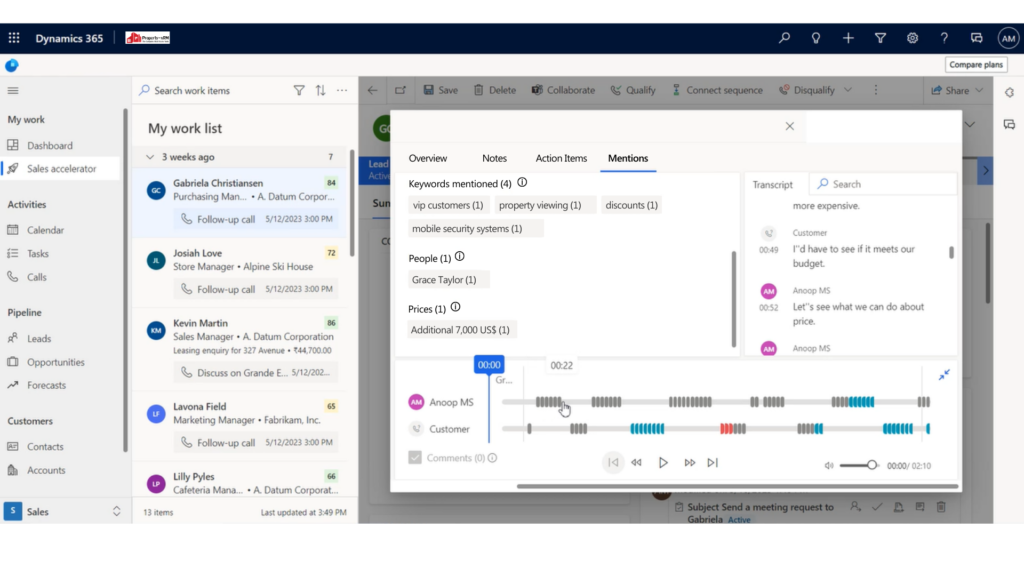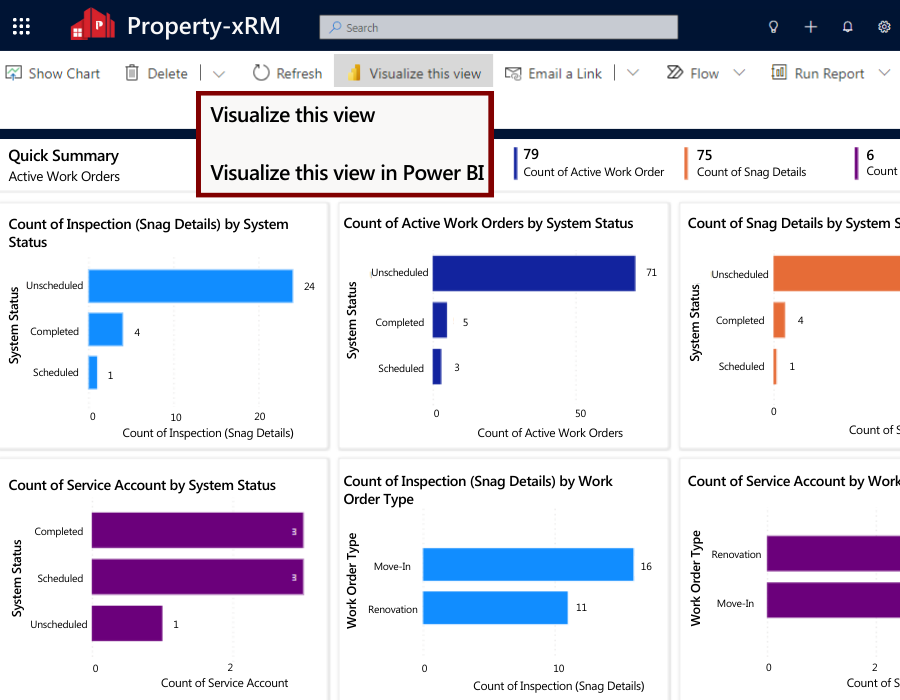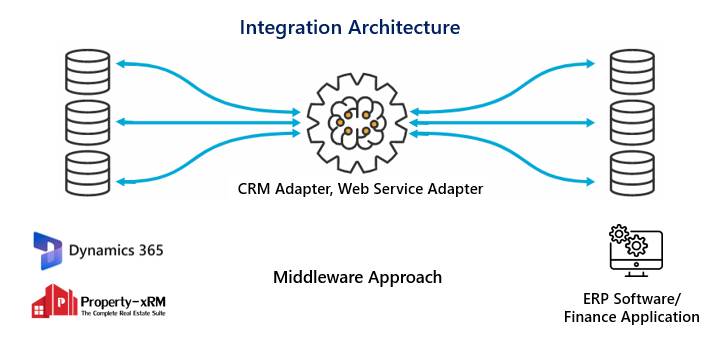
Posted By admin
 Sep 15, 2023
Sep 15, 2023 12:28:00pm
12:28:00pm In the dynamic landscape of real estate management, staying ahead requires efficient tools that not only streamline operations but also foster seamless connectivity. In the quest for the right tools, businesses often tend to invest in multiple applications for various functions. This includes CRM, ERP, Marketing, Property Management, Facilities Management, and more. With multiple applications comes the dreaded challenge of integration. Ask your IT personnel and they will tell you what a pain real estate software integration can be!
But, it doesn’t have to be very complicated.
Microsoft is modernizing business processes for enhanced productivity in daily-use business applications. It’s easier for every business and business function to transform how people work. The open API architecture facilitates relatively easier integration with a diverse range of software solutions across the world. Leveraging the power of the platform, real estate software integration is less of a challenge with Property-xRM.
If you need a specific app to organize your data, you can add it to the power of your business applications. Real Estate businesses can then increase efficiency, enhance data accuracy, improve customer experiences, and unlock new dimensions of efficiency and functionality. Sounds amazing, right?
Every real estate business relies on two main aspects:

Successful real estate businesses often excel in both aspects to create a well-rounded and profitable operation. To help do that, companies invest in proprietary solutions like CRM, ERP, or Property Management Software. While these are individual applications that cater to functional requirements, it becomes very important to look at the overall technology architecture and see if it all works together as a whole.
Proprietary real estate solutions tend to have its share of challenges:
Property-xRM embraces the power of Microsoft’s open API architecture, allowing it to connect with various systems, applications, and data sources. Its integration capabilities empower real estate professionals to create a harmonious ecosystem that fosters collaboration and data-driven decision-making.
For Example, Microsoft Flow, a component of the Microsoft Power Platform, empowers businesses to create automated workflows that seamlessly connect various apps and services. When integrated into Property-xRM, this synergy extends efficiency, accuracy, and collaboration. Let’s explore the integration capabilities of Property-xRM in Real Estate:
While investing in Property-xRM, companies automatically invest in the Microsoft Ecosystem. Property-xRM and Dynamics 365 readily leverage the power of the platform without needing any integrations at all. This includes daily-use applications like Microsoft Excel, Word, PowerPoint, as well as SharePoint. Built-in native connectivity with collaboration tools like Microsoft Teams and Microsoft Outlook ensures all communications, meetings, and keynotes get synced into the cloud CRM database.
Learn more about how Property-xRM combines the best of both worlds – Microsoft Technology and Real Estate best practices here. Some of the key Microsoft ‘extensions’ that come in handy for companies are:
Native Microsoft Outlook Integration for Emails and Appointments: Property-xRM syncs with Outlook, automating information capture and saving critical data directly into the CRM system. Users can schedule emails and site visits right from within the system without manually having to log in to the application.
Native Microsoft Teams Integration for Calls and Meetings: Interactions with residents or prospective tenants can be automatically stored, transcribed, analyzed, and recorded in the system. The Microsoft collaboration capability also allows users to join Teams meetings and calls right from Property-xRM. The latest in AI has also transformed the way users collaborate and boost efficiency.

Native LinkedIn Sales Navigator Integration for Prospecting: Agents involved in commercial and retail leasing can leverage the world’s largest professional network within Property-xRM to find and reach out to the right contacts of a brand or a company. Following LinkedIn’s acquisition in 2016, Microsoft has brought the powerful database natively into Dynamics 365.

Native Power BI Integration for Reporting and Analytics: Users can leverage configurable Power BI reports and dashboards at the click of a button right from within Property-xRM. With options to filter fields, users can build their own views and live dashboards as well. Learn more about Property-xRM Reporting Management.

The importance of having to integrate with third-party applications goes without saying. From our experience working with real estate developers and property management companies across the world, some of the common integration scenarios we have come across are:
Companies looking at a complete digital transformation with Microsoft have opted for a combination of Property-xRM and ERP software like Dynamics 365 (D365) Finance and Operations, D365 Business Central, or D365 AX. In such cases, integrations are less of a challenge because both applications come under the same Microsoft ecosystem.
At the same time, there are companies already invested in third-party finance applications like Oracle (E-Business Suite or Fusion), SAP, JD Edwards, etc. In such cases, there are a number of ways in which integrations can be done with Property-xRM.
Some of them are:
In simple terms, an Application Programming Interface (API) is a type of code that allows software to communicate with each other. Real Estate Software Integration with D365 (Property-xRM) is not difficult since Microsoft provides open APIs making posting and updating content easier. Types of integrations included in Dynamics 365 APIs are:
If the ERP in question also has open APIs, this type of integration is faster, less expensive, and requires lower development efforts. The web APIs can be used to request necessary data/information from the third-party application and pulled into D365 (Property-xRM).
Other aspects of an ERP include procurement, HR, and supply chain which would particularly be relevant in the case of Facilities Management. This is because resources need to be allocated, tracked, and budgeted for tasks. In such cases again, integrations are possible.
Companies can utilize custom tools and applications as well for integration. For example, companies can opt for middleware integration platforms like TIBCO or KingswaySoft. These applications enable connections with systems without actually using process codes. In the case of Microsoft, a Dynamics CRM adapter reduces the efforts and time taken to connect with applications as it minimizes the difficulty in identifying entities and their properties.

Key touch points for ERP integration are often:
Some key benefits of a Middleware approach in real estate software integration are:
Property companies often rely on websites and online inquiries for their leads. Be it their own property website or third-party websites like Internet listing services (ILS), it is critical to be able to pull lead data into CRM.
With Property-xRM, companies can undertake push-and-pull marketing strategies. Be it pushing units or properties to other websites, or capturing leads from third-party websites, integration is less of a challenge since most services offer open API keys. Some of the common names are:
Real Estate companies in the residential sales business usually have aggressive targets for both field sales and call center teams. In such cases, equipping the call center teams with real-time information about the incoming caller becomes critical.
Property-xRM integrates with an organization’s existing call center applications preparing teams with the necessary information. CISCO-based call centers or software solutions like Zendesk, Genesys, etc. can also be integrated with Microsoft Dynamics 365 to automate routine tasks and boost the efficiency of the agents.
Native Marketing automation solutions on Dynamics 365 like ClickDimensions or Microsoft’s own Dynamics 365 for Marketing offer complete social media automation. Manage all social channels and track results through one single platform.
While Property-xRM users can natively leverage Microsoft Teams for communications and messaging, there’s been an increasing demand to integrate with daily applications like WhatsApp or Telegram. Successful integration recently completed with WhatsApp using APIs indicates positive possible connections with similar applications.
Real estate companies that manage their properties, either in-house or through contractors, require facilities management solutions. While companies have the option to opt for native Facilities Management Software, they also can integrate existing systems with Property-xRM. A robust case management module in Microsoft Dynamics 365 seamlessly allows for managing and resolving client requests and issues within the CRM.
Popular solutions like IBM Maximo have successfully been integrated in the past while UpKeep and similar open API solutions have been identified as ‘possible to integrate’ as well.
Gone are the days when integration was considered a nightmare. Sure, it’s a challenging aspect in any digital transformation initiative, but Microsoft’s platform capabilities ease them to an extent. Leveraging native connections with the vast Microsoft ecosystem, Property-xRM offers a scalable solution for real estate developers, home builders, and property management companies.
An all-in-one real estate software for residential sales, residential leasing, retail leasing, owner association, and community service management offers an integrated solution for the industry.
Embracing these integration capabilities opens doors to a future where real estate professionals can focus on what they do best – building relationships, closing deals, and helping clients achieve their real estate dreams. It’s time to unlock the full potential of your real estate business with the power of collaboration with Microsoft and Property-xRM.


